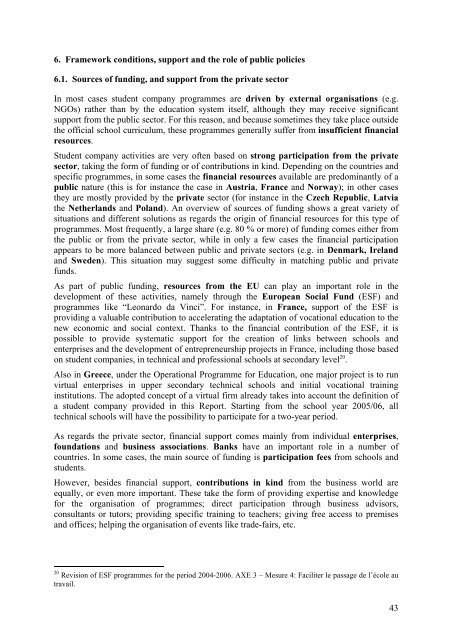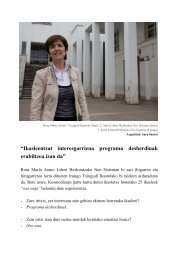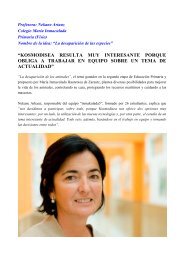Final Report of the Expert Group - European Commission - Europa
Final Report of the Expert Group - European Commission - Europa
Final Report of the Expert Group - European Commission - Europa
You also want an ePaper? Increase the reach of your titles
YUMPU automatically turns print PDFs into web optimized ePapers that Google loves.
6. Framework conditions, support and <strong>the</strong> role <strong>of</strong> public policies6.1. Sources <strong>of</strong> funding, and support from <strong>the</strong> private sectorIn most cases student company programmes are driven by external organisations (e.g.NGOs) ra<strong>the</strong>r than by <strong>the</strong> education system itself, although <strong>the</strong>y may receive significantsupport from <strong>the</strong> public sector. For this reason, and because sometimes <strong>the</strong>y take place outside<strong>the</strong> <strong>of</strong>ficial school curriculum, <strong>the</strong>se programmes generally suffer from insufficient financialresources.Student company activities are very <strong>of</strong>ten based on strong participation from <strong>the</strong> privatesector, taking <strong>the</strong> form <strong>of</strong> funding or <strong>of</strong> contributions in kind. Depending on <strong>the</strong> countries andspecific programmes, in some cases <strong>the</strong> financial resources available are predominantly <strong>of</strong> apublic nature (this is for instance <strong>the</strong> case in Austria, France and Norway); in o<strong>the</strong>r cases<strong>the</strong>y are mostly provided by <strong>the</strong> private sector (for instance in <strong>the</strong> Czech Republic, Latvia<strong>the</strong> Ne<strong>the</strong>rlands and Poland). An overview <strong>of</strong> sources <strong>of</strong> funding shows a great variety <strong>of</strong>situations and different solutions as regards <strong>the</strong> origin <strong>of</strong> financial resources for this type <strong>of</strong>programmes. Most frequently, a large share (e.g. 80 % or more) <strong>of</strong> funding comes ei<strong>the</strong>r from<strong>the</strong> public or from <strong>the</strong> private sector, while in only a few cases <strong>the</strong> financial participationappears to be more balanced between public and private sectors (e.g. in Denmark, Irelandand Sweden). This situation may suggest some difficulty in matching public and privatefunds.As part <strong>of</strong> public funding, resources from <strong>the</strong> EU can play an important role in <strong>the</strong>development <strong>of</strong> <strong>the</strong>se activities, namely through <strong>the</strong> <strong>European</strong> Social Fund (ESF) andprogrammes like “Leonardo da Vinci”. For instance, in France, support <strong>of</strong> <strong>the</strong> ESF isproviding a valuable contribution to accelerating <strong>the</strong> adaptation <strong>of</strong> vocational education to <strong>the</strong>new economic and social context. Thanks to <strong>the</strong> financial contribution <strong>of</strong> <strong>the</strong> ESF, it ispossible to provide systematic support for <strong>the</strong> creation <strong>of</strong> links between schools andenterprises and <strong>the</strong> development <strong>of</strong> entrepreneurship projects in France, including those basedon student companies, in technical and pr<strong>of</strong>essional schools at secondary level 20 .Also in Greece, under <strong>the</strong> Operational Programme for Education, one major project is to runvirtual enterprises in upper secondary technical schools and initial vocational traininginstitutions. The adopted concept <strong>of</strong> a virtual firm already takes into account <strong>the</strong> definition <strong>of</strong>a student company provided in this <strong>Report</strong>. Starting from <strong>the</strong> school year 2005/06, alltechnical schools will have <strong>the</strong> possibility to participate for a two-year period.As regards <strong>the</strong> private sector, financial support comes mainly from individual enterprises,foundations and business associations. Banks have an important role in a number <strong>of</strong>countries. In some cases, <strong>the</strong> main source <strong>of</strong> funding is participation fees from schools andstudents.However, besides financial support, contributions in kind from <strong>the</strong> business world areequally, or even more important. These take <strong>the</strong> form <strong>of</strong> providing expertise and knowledgefor <strong>the</strong> organisation <strong>of</strong> programmes; direct participation through business advisors,consultants or tutors; providing specific training to teachers; giving free access to premisesand <strong>of</strong>fices; helping <strong>the</strong> organisation <strong>of</strong> events like trade-fairs, etc.20 Revision <strong>of</strong> ESF programmes for <strong>the</strong> period 2004-2006. AXE 3 – Mesure 4: Faciliter le passage de l’école autravail.43




